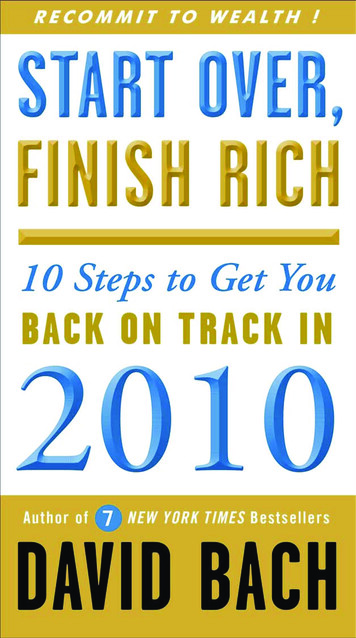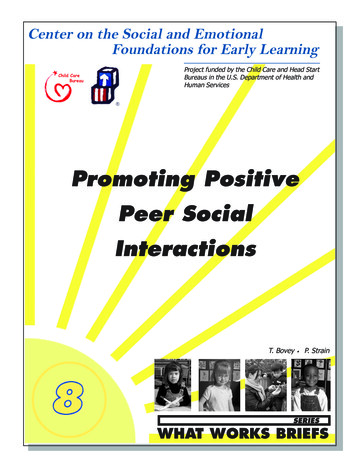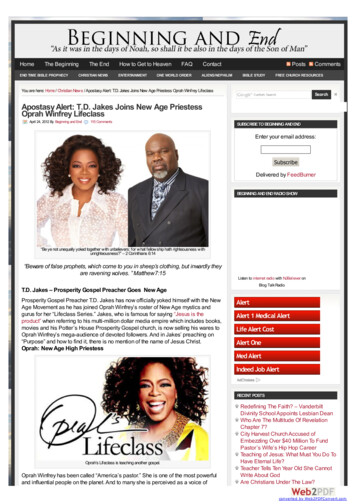
Transcription
Dear Friend,Welcome to the free download of my newbook, Start Over, Finish Rich! You have taken thefirst step in putting your finances—and yourdreams—back on track in 2010. As you’ll see,this is a very powerful book. It’s super short andsuper simple. You’ll be able to read it in acouple of hours. But it’s going to change yourlife and totally motivate you to join in theeconomic recovery that comes after a recession.The recovery is starting now—and you cannotafford to miss it! This book gives you youraction plan for 2010. I’ll show you how to: Get out of debt Fix your credit Rebuild your 401(k) plan Take SMART risks Make your financial recovery automatic Rebuild with real estate And much moreWhatever you may have lost in the last few years—that’s behind you.Life is too short to stay down. So please take this book—take yourdreams—and START OVER.Thank you for reading this, and please know that I am honored andgrateful that you spent this time with me. I want to hear about how2010 works out for you so email me your success story atsuccess@finishrich.com and stay connected in the following ways:VISIT MY WEBSITEBUY THE BOOKJOIN OUR FACEBOOK COMMUNITYSUBSCRIBE TO MY NEWSLETTERFOLLOW ME ON TWITTERSUBSCRIBE TO MY NEWS FEEDNow start reading—and take your first steps on the new road towealth in 2010!Your friend,David BachJanuary 4, 2010
bach text 7:Layout 1 11/12/09 2:25 PM Page viThis book is designed to provide accurate and authoritative information on thesubject of personal finances. While all of the stories and anecdotes described inthe book are based on true experiences, most of the names are pseudonyms, andsome situations have been changed slightly for educational purposes and to protect each individual’s privacy. It is sold with the understanding that neither the Author nor the Publisher is engaged in rendering legal, accounting, or other professional services by publishing this book. As each individual situation is unique,questions relevant to personal finances and specific to the individual should be addressed to an appropriate professional to ensure that the situation has been evaluated carefully and appropriately. The Author and Publisher specifically disclaimany liability, loss, or risk which is incurred as a consequence, directly or indirectly,of the use and application of any of the contents of this work.Copyright 2009 by David BachAll rights reserved.Published in the United States by Broadway Books, an imprint of the CrownPublishing Group, a division of Random House, Inc., New York.www.crownpublishing.comBROADWAY BOOKS and the Broadway Books colophon are trademarks ofRandom House, Inc.The Automatic Millionaire Homeowner, The Automatic Millionaire, The LatteFactor, Smart Women Finish Rich, and Smart Couples Finish Rich are registeredtrademarks of FinishRich, Inc.Library of Congress Cataloging-in-Publication DataBach, David.Start over, finish rich : 10 steps to get you back on track in 2010 /David Bach. — 1st ed.p. cm.Includes index.1. Finance, Personal. 2. Financial crises. 3. Recessions. I. Title.HG179.B2444 2009332.024'01—dc222009035406ISBN 978-0-307-59119-7Printed in the United States of America10 9 8 7 6 5 4 3 2 1First Edition
bach text 7:Layout 1 11/12/09 2:25 PM Page 39STEP 3DEAL WITHYOUR CREDITCARD DEBTIf you don’t have credit card debt, congratulations!You can move on to Step 4. But if you are like millions of Americans, the past year may have pushedyour debt situation from not-great to red alert. As theeconomy got tight, the credit card companies haveincreased interest rates, lowered credit ceilings, andcanceled accounts in an attempt to shore up theirbottom line. Even before the recession made themmore creative, their schemes worked so well thatAmerican consumers currently owe nearly 1 trillionin credit card debt—and are paying an additional 15 billion or so each year in fees they don’t deserve.
bach text 7:Layout 1 11/12/09 2:25 PM Page 4040Start Over, Finish RichIf you are among the millions of Americans whoare drowning in credit card debt (and some expertsestimate this group may include as many as 50 million of us), there are two things you should know—you are not alone and you truly can fix this problem.It won’t be easy, but you can get out of debt. In fact,you can probably do it without any outside help!This chapter will provide you with a road map toget you back on a solid financial footing once and forall. In the next few pages I will teach you what I callmy DOLP system. DOLP stands for Dead on LastPayment. It’s a simple, proven way to prioritize yourdebts and figure out in literally minutes how to paythem off as quickly and efficiently as possible. I’malso going to share with you how the new credit cardlaws enacted in 2009 can protect you from the creditcard companies that helped you get in this mess inthe first place.ARE YOU IN CREDIT CARD DEBT?HOW DID YOU GET THERE?According to Federal Reserve statistics, the averagefamily that carries a credit card balance owes nearly 17,000. That’s the average. In my experience as a“money coach” for nearly two decades, I’ve seenfirsthand that when it comes to credit cards, many ofus operate way, way above the average. On Oprah’sDebt Diet Series and on the weekly “Money 911” seg-
bach text 7:Layout 1 11/12/09 2:25 PM Page 41Step 3: Deal with Your Credit Card Debtments I did on the Today show in 2009, I met peoplewho had 25,000, 50,000, 75,000—even more than 100,000—in credit card debt.The amazing thing about this is that credit cardsdon’t have arms or legs. They can’t jump out of yourwallet or your purse and go on a spending spree ontheir own. So if you are over your head in credit carddebt, how exactly did you get there? Be honest. Didyou buy things you wanted or things you needed? Didyou live beyond your means? Or did you run into acrisis, like having to pay for an expensive medicalproblem or feeding your family after you lost your job?Everyone’s situation is different. But there is onething I can tell you that I know is true: Whatever gotyou into credit card debt is going to keep you there ifyou don’t change how you spend money. My grandmother used to say, “If you can’t pay cash, you can’tafford to buy it.” So if you are drowning in debt, mybest advice is this: STOP USING YOUR CREDITCARDS. Once you are in a hole, YOU MUST STOPDIGGING.IF YOU’RE ABLE TO MAKE THE MINIMUMPAYMENT ON YOUR CREDIT CARD DEBT,HERE’S WHAT YOU SHOULD DOOkay—you’ve accepted your share of responsibilityfor your problem and you’ve put your credit cardsaway. Now it’s time to start reducing that mountain of41
bach text 7:Layout 1 11/12/09 2:25 PM Page 4242Start Over, Finish Richdebt you somehow managed to run up. The first bigquestion you need to answer is whether you can affordto make the minimum payments on all your creditcard accounts. If the answer is yes, then you can—andshould—immediately start using my DOLP debtreduction system. If the answer is no, then DOLPwon’t work for you, but later on in this chapter I’llhave some other suggestions that will.As I said earlier, DOLP stands for Dead on LastPayment—and it is meant to solve a problem thattrips up most people who owe credit card debt. Generally speaking, people in real debt trouble owemoney on more than one credit card. Often, therecan be as many as a half-dozen accounts with balances due. So how do you handle that? Should youpay a little on all of them each month or concentrateon trying to pay off just one? And if so, which one?Without a coherent plan of attack for paying offyour debt, you really don’t have a chance. The DOLPsystem is designed to give you that plan of attack byprioritizing your debts—that is, establishing the orderin which you should pay down your various cards.Are you ready? This will take no more than 10minutes.DOLPING YOUR WAY OUT OF DEBT1. Pull out your credit card statements and get themorganized. Make file folders for all your credit
bach text 7:Layout 1 11/12/09 2:25 PM Page 43Step 3: Deal with Your Credit Card Debtaccounts. Ideally, the folders should be red so theywill stand out in your file drawer. On the front ofeach, use a big black marker to write the totalamount you owe on that card. The point of all this isto get your debts organized. Having bills lyingaround your kitchen in a bowl, or in a drawer, or ontop of the television, is not a system. So put downthis book, go get the files, and start labeling them.2. Get yourself a DOLP worksheet and fill itout. You’ll find a blank worksheet on page 44. Youcan tear it out, photocopy it, or download and printout a copy for free from www.finishrich.com/dolp.Whether you do it by hand or use the interactive toolon the website, filling out the worksheet is reallyeasy. You simply write in the name of the account,the outstanding balance you owe, the minimummonthly payment, and the payment due date. (Fornow, don’t worry about the DOLP number and theDOLP ranking.)3. Calculate each account’s DOLP number. Giveeach account its own DOLP number. You calculate itby dividing the outstanding balance by the minimummonthly payment. For example, say you owe 1,000on your Visa card and the minimum monthly payment is 50. Dividing 1,000 by 50 gives you aDOLP number of 20. Do this for all of your creditcard accounts.43
bach text 7:Layout 1 11/12/09 2:25 PM Page 4444Start Over, Finish RichDOLP ymentPaymentDue DateDOLP Number(Balance Min Payment)DOLPRanking4. Assign a DOLP ranking to each account. The account with the lowest DOLP number is ranked #1.The account with the second-lowest number is #2.And so on. The table on page 45 gives you an example of how this might look.5. Calendar the due dates. Enter the payment duedates for all your credit accounts in your computer’scalendar system. Set your calendar software to remindyou of each due date at least five days in advance soyou don’t make any late payments and add to yourmisery by getting hit with costly late fees and penalties.And sign up for those email alerts the credit card companies will send you when your bills are coming due.
bach text 7:Layout 1 11/12/09 2:25 PM Page 45Step 3: Deal with Your Credit Card DebtDOLP ymentPaymentDue DateDOLP Number(Balance Min Payment)DOLPRankingVisa 500 5010th ofthe month101MasterCard 775 6515th ofthe month122Sears Card 1,150 351st ofthe month3936. Start paying down your debt—the DOLP way.Each month, as the payment due dates approach,make the minimum payment on every account . . .EXCEPT for the one with the #1 DOLP ranking. Forthat card, make as big a payment as you can manage. Ideally, your payment should be at least doublethe minimum. (Hopefully, finding your Latte Factor will make it easier to come up with the extramoney you will need for this.) Using the examplesin the sample worksheet, you would pay 65 toMasterCard, 35 to Sears, and at least 100 to Visa.Once a card has been paid off entirely, you retire itand start paying down the card with the #2 DOLPranking—in the example above, the MasterCard.45
bach text 7:Layout 1 11/12/09 2:25 PM Page 4646Start Over, Finish RichYOU NOW HAVEA SYSTEM TO FREE YOU FROMCREDIT CARD DEBTThe DOLP system works by identifying the card youcan pay off most quickly and then having you pay itoff first. The point of doing this is to reduce thenumber of different cards you owe money on as fastas possible.This is super important, because the more balances you carry, the greater the chance that you willmiss a payment or go over a credit limit—and get hitwith a huge penalty. The fact is, a card with even asmall balance can cost you a fortune. If you miss apayment on an account with a 500 balance, the latefee could be as much as 50. If you exceed your creditlimit at the same time, the fee could be 100. This iswhy credit cards with small balances are as dangerous as big ones.HOW TO GETYOUR INTEREST RATESLOWEREDYou can make your DOLP plan work even faster bylowering the interest rates on your cards. As I writethis in the summer of 2009, the average fixed ratefor standard cards is 13.46%, but the rate you arebeing charged is likely much higher than that. Many
bach text 7:Layout 1 11/12/09 2:25 PM Page 47Step 3: Deal with Your Credit Card Debtof you have credit cards that charge rates approaching 30%.Unfortunately, the interest rate game is one forwhich there is no clear road map. It used to be that toget the credit card company to lower your rate, allyou had to do was ask. These days, it is a differentstory entirely. Indeed, some companies have beenknown to respond to customers’ requests for lowerrates by jacking them up!Here’s the approach I’d suggest for getting a better interest rate in this era of tight credit.First, know the rate you are currently paying oneach of your cards. You should find a listing for “annual percentage rate” (or APR) at the bottom of yourmost recent credit card statement.Second, find out how your rates compare to thenational averages. You can get the latest averages atwebsites like www.bankrate.com, www.lowcards.com, www.cardtrak.com, www.creditcard.com, www.cardweb.com, and www.credit.com.The credit card companies offer five basic kindsof rates, depending on what kind of borrower they’redealing with: super-prime for the most creditworthy,prime for average borrowers, sub-prime for belowaverage types, promotional for new customers, andpunitive for those who’ve broken the rules (say, bymissing payments or exceeding their credit limits).The following table shows how the rates differ foreach category.47
bach text 7:Layout 1 11/12/09 2:25 PM Page 4848Start Over, Finish RichFIVE KINDS OF CREDIT CARD RATESJULY %12.05%18.99%2.01%27.75%JANUARY 099.00%13.37%19.49%1.68%28.57%JULY 089.88%14.17%21.33%2.32%29.99%Note: Average rates based on FICO credit scores.Super-Prime 760–850; Prime 660 –759; Sub-Prime 500 – 659.Source: CardTrak.comWhen you compare your rates to the currentaverages, make sure you are in the right category. A“super-prime” borrower shouldn’t be paying a regular “prime” rate. If you are, call your credit card company and ask why. Remember, unless you make alittle fuss, no one is going to help you.When you call the card company, USE YOURKNOWLEDGE. Don’t settle for the first person whohappens to pick up the phone. Always ask to speak toa supervisor. Once you get one (and you may have toinsist, since some credit card companies now traintheir customer-service people NOT to transfer yourcall), go over your rate, compare it to the competition’s, and ask whether they would be willing to workwith you to give you a better deal.If the answer is: “Sorry, but there is nothing we
bach text 7:Layout 1 11/12/09 2:25 PM Page 49Step 3: Deal with Your Credit Card Debtcan do,” ask them how is that possible? The fact is,there is always something they can do. The cardcompanies lower their rates all the time, every dayof the year, every minute of the day. On the OprahDebt Diet, I worked with one couple who had 12credit cards, and we were able to get all but one ofthem to lower their rates to below 5%. In somecases, it took multiple calls, but it paid off in theend.TRY THE CREDIT CARD COMPANIES’DEDICATED HELP LINESTO GET YOUR RATE LOWEREDEach of the major credit card companies has a dedicated help line devoted exclusively to assisting customers who are having problems with credit carddebt. If calling the company directly does not get youa lower interest rate, the folks on the dedicated helpline may be able to do better.Here are the key phone numbers. (You can alsofind them on www.helpwithmycredit.org, which Iwill discuss in a second.)1.2.3.4.Bank of America: (800) 500-5306Capital One: (866) 929-5303Discover Card: (866) 567-1660FIA Card Services: (888) 635-077649
bach text 7:Layout 1 11/12/09 2:25 PM Page 5050Start Over, Finish Rich5. Citi: (866) 936-48146. Citi, for your Sears Card : (866) 532-95327. Citi, for The Home Depot Credit Card: (866)532-96898. Citi, for your Macy’s Credit Card: (866) 785-10799. Citi, for your retail and gas cards: (866) 683-0924IF YOU CAN’T AFFORD TO MAKETHE MINIMUM PAYMENTS,HERE’S WHAT YOU SHOULD DOThe DOLP system works only if you can afford tomake the minimum payments on all your cards. Ifyou can’t, please don’t ignore the situation. That willonly make things worse. Instead, reach out to thecredit card companies. You’d be surprised how easy itcan often be to work things out with them.Here is what I suggest you do:First, take advantage of Help With My Credit, a resource for struggling consumers created by a group ofmajor card issuers, including Bank of America, Capital One, Citi, and Discover Card, plus the MasterCardand Visa networks. The service—which is availablethrough both a toll-free number, (866) 941-1030, anda website (www.helpwithmycredit.org)—offers tipson managing your credit cards, communicating withthe card companies, and finding an accredited creditcounselor.
bach text 7:Layout 1 11/12/09 2:25 PM Page 51Step 3: Deal with Your Credit Card DebtASK THE CREDIT CARD COMPANIESABOUT THEIR “DEBTMANAGEMENT PLANS”In an effort to prevent too many consumers from defaulting entirely on their debts, the credit card companies are now offering customers what they calldebt-management plans. In a typical DMP, you canget your interest rate slashed (and sometimes eliminated entirely) in return for signing on to a guaranteed repayment program, in which payments areautomatically debited from your checking accounteach month.I’ve coached people who had their interest ratescut from 29% to zero as a result of signing up for adebt-management plan. On top of that, card companies are often willing to waive the monthly over-thelimit fees for DMP participants who’ve exceededtheir credit limits.The downside to these programs is that onceyou sign up, the credit card company will usuallyclose your account or at least “freeze” it so youcan’t use it anymore. As we’ll see in the next step,this can lower your credit score. Indeed, simply reporting that an account of yours has been placedon a payment or settlement plan can hurt yourcredit rating.An explanation of how your credit record may be51
bach text 7:Layout 1 11/12/09 2:25 PM Page 5252Start Over, Finish Richaffected and whether they will notify the credit bureaus is usually included in the contract the cardcompanies make you sign before they let you begin aDMP. Before you sign, READ THE CONTRACT! It iscrucial that you understand just what you’re gettinginto (including what happens if you don’t stick withthe program).Some credit card companies won’t report yourparticipation in a DMP if you ask them not to. Notpaying your cards at all will hurt your score a lotmore than being in a DMP plan. So will having yourdebt “charged off,” which is what happens if you stopmaking payments altogether. Anyway, once your debtis paid down, your credit score will head back upagain.IF THE CREDIT CARDCOMPANIES CAN’T HELP YOU,GET COUNSELINGThe more work I do with credit-challenged people,the more I am becoming an advocate for consumercredit counseling. The only catch is that you have tofind an honest company to work with. If you can—and it’s not all that hard—the benefits can be enormous.A good nonprofit credit-counseling agency willshow you how to deal with your spending and create
bach text 7:Layout 1 11/12/09 2:25 PM Page 53Step 3: Deal with Your Credit Card Debta payment plan to pay down your debt. They can alsohelp you negotiate a debt-management plan withyour creditors. In 2009, the credit card companiesreached an agreement to make it easier for nonprofitcredit-counseling organizations to help people in“hardship” situations. So ask about the new DMPrules when you call.To get connected to a reputable nonprofit creditcounseling organization in your area, contact the National Foundation for Credit Counseling by callingtoll-free (800) 388-2227 or by visiting their website atwww.debtadvice.org.In addition to the NFCC, you might also contactone of the following organizations for help withcredit card debt:Association of Independent Consumer CreditCounseling Agencieswww.aiccca.org(866) 703-8787Money Management Internationalwww.moneymanagement.org(866) 304-3818Novadebtwww.novadebt.org(866) 312-288753
bach text 7:Layout 1 11/12/09 2:25 PM Page 5454Start Over, Finish RichTake Charge Americawww.takechargeamerica.org(877) 822-6060AN IMPORTANT WARNINGABOUT “NONPROFIT”CREDIT COUNSELINGNot all credit counseling is created equal—and“nonprofit” doesn’t necessarily mean fair or honest.You must investigate whomever you use before youuse them. Check with the NFCC as well as the localoffice of the Better Business Bureau. In addition, askthe agency you’re considering for references. You’llwant to speak to at least five customers they havehelped.Do not use a credit-counseling service that does anyof the following:1. Charges you high up-front or monthly fees to enroll in a debt-management plan2. Pressures you to make “donations” for theirservices3. Tries to enroll you in a DMP without first reallylooking at your situation, reviewing your billsand budget, or educating you about basic moneymanagement skills4. Demands that you make payments to a DMP
bach text 7:Layout 1 11/12/09 2:25 PM Page 55Step 3: Deal with Your Credit Card DebtBEFORE the credit card companies have accepted you into a program5. Refuses to put in writing what they are promisingto do to help you6. Won’t provide referrals of people they havehelpedBEWARE OF“DEBT-SETTLEMENT”COMPANIESAs much as I am an advocate of credit counseling, Iam leery of “debt-settlement” companies. These outfits offer to negotiate a settlement on your behalfwith the credit card companies, often promising thatthey can “wipe out your debt or cut it in half.” Theirstandard procedure is to tell you that if you stop paying the credit card companies and pay them instead,they will then be able to negotiate a settlement foryou. In fact, there is no way to guarantee that yourcredit card company will accept a settlement fromone of these companies.Be very careful—it’s amazing how many people Ihave seen ripped off by debt-settlement companies.One couple I did a “makeover show” with made payments to a debt-settlement outfit for a year—only tofind they never paid off any of their credit card debt.It almost pushed them into bankruptcy.55
bach text 7:Layout 1 11/12/09 2:25 PM Page 5656Start Over, Finish RichTAKE ADVANTAGE OF THENEW CREDIT CARD ACT OF 2009(IN EFFECT FEBRUARY 2010)Now for some good news. As I mentioned earlier, as aresult of new legislation enacted in 2009, the creditcard industry has a new set of rules it must live by. Ofcourse, you have to know your rights in order to beable to take advantage of them. So here is what youneed to know about this new law.It’s called the Credit Card Accountability, Responsibility, and Disclosure Act of 2009 (or Credit CARD Act,for short). Although it was passed and signed into lawin May 2009, it wasn’t meant to take effect until February 2010. Under it, pretty much all the confusing andcontradictory practices that were deliberately designed to get consumers to run up bigger balances arenow prohibited. Among other things, the act bans:1. Arbitrary “any time, any reason” rate increaseson existing balances2. Double-cycle billing (under which interestcharges are based not on your current balancebut on your average daily balance for the past twobilling cycles—which means you could becharged interest on balances you paid off ontime)3. Universal default (a provision in credit card
bach text 7:Layout 1 11/12/09 2:25 PM Page 57Step 3: Deal with Your Credit Card Debtagreements that gives the card company the rightto jack up your interest rate if you are more than30 days late paying any bill you owed to anyone—even a telephone or utility bill that has nothing todo with your credit card)4. Late-fee traps such as weekend deadlines, duedates that change each month, and deadlines thatfall in the middle of the dayAt the same time, the new law requires banks toplay fair with cardholders, which includes:1. Applying partial payments to the highest interestbalance first2. Obtaining your permission before processing anytransaction that would put you over your creditlimit3. Giving you a 45-day notice of any interest rate increases (which should be enough time to getyourself a new card with a better rate)4. Giving you a reasonable amount of time to payyour monthly bills (at least 21 calendar days fromtime of mailing)5. Writing credit card contracts and billing statements in clear, understandable English (including spelling out how long it will take you to payoff a balance if you make only minimum payments)57
bach text 7:Layout 1 11/12/09 2:25 PM Page 5858Start Over, Finish Rich6. Clearly identifying temporary promotional ratesas such—and keeping them in effect for at leastsix monthsThese new rules are great, but they won’t enforcethemselves. If you find a credit card company playingthe old games with you, you need to get in thedriver’s seat and call them to account. Don’t be shyabout threatening to report them for violating thenew law, if that’s what you think they’ve done. As mygrandmother used to tell me, you only get back whatyou ask for.WHAT SHOULD I DOIF MY CREDIT CARD DEBT HASALREADY BEEN “CHARGED OFF”?At some point, if you’ve gotten really behind on yourcredit card payments, the credit card company maythrow up its hands and “charge off your debt”—meaning they write off the debt as a loss and sell it toa collection agency. If this has happened to you, hereis what you need to do.First, get copies of your credit reports (see page68 for details on how to do this for free) and checkif the debt shows up as having been “charged off.” Ifit does, the damage is basically done. The charge-offwill stay on your report for up to ten years, depending on the state, and it will bring down your credit
bach text 7:Layout 1 11/12/09 2:25 PM Page 59Step 3: Deal with Your Credit Card Debtscore. But here’s the good news: It also means thatwhoever is now calling you and harassing you topay them is a collection agency that has boughtyour debt from the credit card company and is simply trying to make money on their investment.TIME BARRED DEBTS—READ THIS BEFORE YOU SETTLE!If you have fallen behind on payments on your debt,and you are now being harassed by a “debt collectionagency” you may have rights you don’t realize. Therules vary from state to state, but in most states thereis a statute of limitations on your “time barred”debt—usually between three to ten years (in somecases longer). First, I want you to go to the government website, www.ftc.gov, and in the search boxenter “time-barred debts.” You may find that yourdebt has already cleared the date from which you canbe sued by a creditor or debt collector. Also if you settle now, you may restart the time this negative markappears on your credit record!According to the FTC website most debts thathave been delinquent more than seven years cannotappear on your credit report. Also there are laws toprotect you from being harassed by creditors anddebt collectors. Google Fair Debt Collection Practice(FDCPA) to know your rights.Finally, if you think you are being unfairly ha-59
bach text 7:Layout 1 11/12/09 2:25 PM Page 6060Start Over, Finish Richrassed based on your rights, call the FTC toll-freehotline at 1-877-FTC-HELP. There is a wealth of information at www.ftc.gov. Do not settle anything,even if it’s for pennies on the dollar, until you knowyour rights.EXCELLENT—NOW LET’S LOOKAT YOUR CREDIT SCOREYou are taking action on your debt and doing great!Now it’s time to consider your credit score. Let’s golook at what you can do quickly not only to protectyour score, but also to push it back up if it hasdropped in the last year or two.TO DO IN 2010ឡ፬ If you are drowning in debt, STOP USINGYOUR CREDIT CARDS!፬ Pay the minimum on every card except one (usethe DOLP system described on page 42 to decide which one). Pay as much as you can on thatone card until it is paid off. Repeat with thenext card.፬ Use the chart on page 48 to determine whatkind of interest rate you should be getting onyour credit cards, from Super-Prime to Punitive.Find out how your cards’ rates compare to the
bach text 7:Layout 1 11/12/09 2:25 PM Page 61Step 3: Deal with Your Credit Card Debtnational averages. Armed with this knowledge,contact the credit card companies and ask forthe lower interest rate you deserve.፬ If you can’t afford to make your minimum payments, ask your credit card companies abouttheir debt-management plan—and if they can’t(or won’t) help you, get credit counseling from areputable nonprofit agency recommended bythe National Foundation for Credit Counseling.፬ If your debt has been sold to a collectionagency, prioritize this debt last and, when youare ready, negotiate to pay a fraction of thedebt.61
action plan for 2010. I'll show you how to: Get out of debt Fix your credit Rebuild your 401(k) plan Take SMART risks Make your financial recovery automatic Rebuild with real estate And much more Whatever you may have lost in the last few years—that's behind you. Life is too short to stay down.










